December 22, 2017
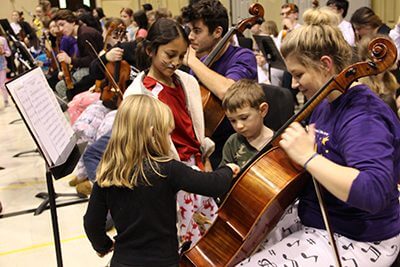 by Leah Abbe Bloem, Orchestra Director
by Leah Abbe Bloem, Orchestra Director
Pajamarama is pure joy at its finest! This year’s event will be once again combined with the Lower School Admission Preview and held on Thursday, February 1. The evening will begin at 5 PM for prospective families and 5:30 PM for current families.
This Mounds Park Academy original event is a concert created by Upper School orchestra students for Lower School students and their families. The creative endeavor gives Upper School students a chance to entertain and engage with the younger children with unabashed delight. They get to remember what it was like to be a little kid, hearing an orchestra for the first time, in such a welcoming, happy, and fun atmosphere.
Celebrating the MPA Community
We are very fortunate to have pre-kindergarten through high school students all on one campus, which builds a strong sense of community that feels like home. The Upper School orchestra students learn the music and plan a carnival with the understanding that the performance is not about them, but rather what they are giving to, and sharing with, the broader community.
The strong connection between Upper and Lower School students is evident every day at MPA, including at this event. Each student is kind and supportive of one another. At the event, the little ones are encouraged to try games again and again until they win, with cheers from the older students. Even those waiting in line will tell their peers in front of them to try again if they didn’t win the first time.
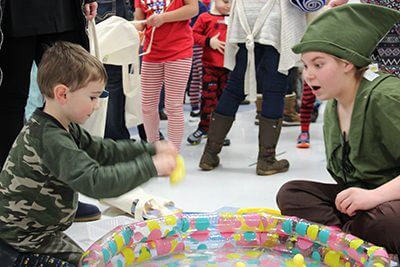
Experiencing the Joy of Musical Performance
Pajamarama is important because it gives the Upper School students a chance to look past the technical side of music education and experience the joy of sharing a musical performance. It also provides the opportunity for the orchestra students to really consider who their audience is and create an experience for them. The Upper School students learn about games and music that they may not even know in order to make each and every audience member feel valued and celebrated. They enjoy having the chance to give back to a school and community they love so much.
Creativity at Mounds Park Academy
Pajamarama began as a Disney concert approximately ten years ago. When I started teaching the orchestras four years ago, I decided to add the carnival portion to the night as well as to make the performance more interactive.
In most ensembles, it is common for the director to make the majority of the decisions regarding music and programming. However, for this performance almost all of the games and music have been planned, designed, and carefully developed by the Upper School orchestra students. Consequently, it is a powerful exercise in directing an entire artistic experience that they then perform for the community. The Upper School students both embrace their honed musical and artistic skills and simultaneously return to the delight of their youth through the games and activities with their younger friends.
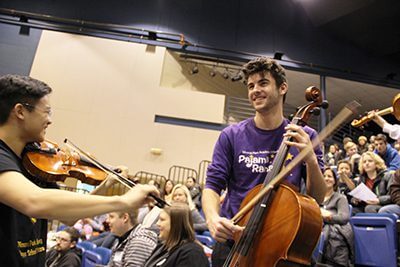 Delighting Kids of All Ages
Delighting Kids of All Ages
Students and parents alike love the performance. Upper School parents tell me how much fun it is to watch their child act like a little kid again and jump right into all the games, dancing, and singing. It is a reminder that we are all kids at heart and that we don’t have to grow up too fast. Along with the carnival, we also have milk and cookies at the end of the night, while our characters read bedtime stories.
At first glance, one would assume that the Lower School students enjoy the performance the most. However, watching these high-school-age students interact with their younger counterparts always proves that they are just as excited as the grade school students. In rehearsals, the Upper School students are slightly hesitant to sing songs by Raffi and dance to the Hokey Pokey while trying to play their instrument, but once they get a chance to dance and sing with the younger kids, one can see nothing but smiles on all of their faces.
Prospective families should RSVP in advance here! We look forward to welcoming you to Pajamarama!
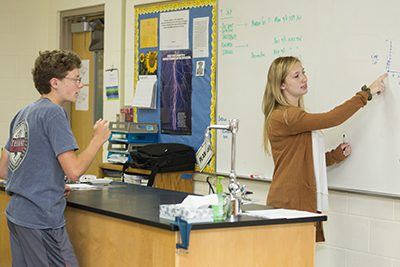 by Dr. Bill Hudson, Head of School
by Dr. Bill Hudson, Head of School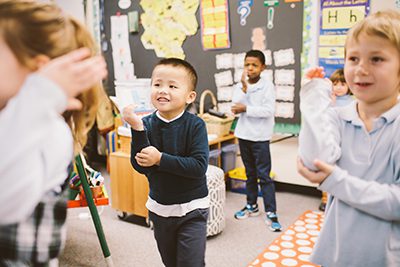 When we reflect on the benefits of private school in general, and MPA specifically, the word “connection” comes to mind. When we talk about connection in the context of private school benefits, we see it as a thread through all that we do and offer. We see creating connections as central to the benefits of a private school education.
When we reflect on the benefits of private school in general, and MPA specifically, the word “connection” comes to mind. When we talk about connection in the context of private school benefits, we see it as a thread through all that we do and offer. We see creating connections as central to the benefits of a private school education.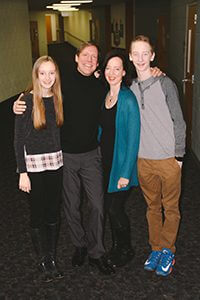 Upper School
Upper School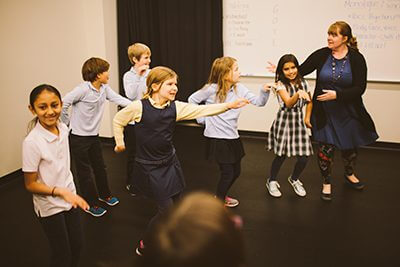 Drama Faculty
Drama Faculty by Leah Abbe Bloem, Orchestra Director
by Leah Abbe Bloem, Orchestra Director
 Delighting Kids of All Ages
Delighting Kids of All Ages MPA alum Rose Miller ’06 received a special honor at the Animal Humane Society called the Values Award. This recognition celebrates individuals who have made extraordinary contributions to the organization and exemplify the Animal Humane Society’s organizational values: be good to animals, partner with people, and lead responsibly with compassion.
MPA alum Rose Miller ’06 received a special honor at the Animal Humane Society called the Values Award. This recognition celebrates individuals who have made extraordinary contributions to the organization and exemplify the Animal Humane Society’s organizational values: be good to animals, partner with people, and lead responsibly with compassion.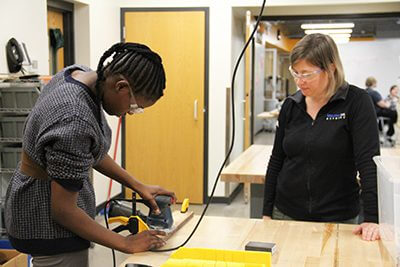 Upper School student Cloris Lin established MPA’s Design Club this year as a creative outlet beyond the classroom. The Makerspace became home to the club, hosting their meetings officiated by Ms. Koen. The meetings, which take place every Monday during lunch and after school, begin with one simple question: “What do you want to make?”
Upper School student Cloris Lin established MPA’s Design Club this year as a creative outlet beyond the classroom. The Makerspace became home to the club, hosting their meetings officiated by Ms. Koen. The meetings, which take place every Monday during lunch and after school, begin with one simple question: “What do you want to make?”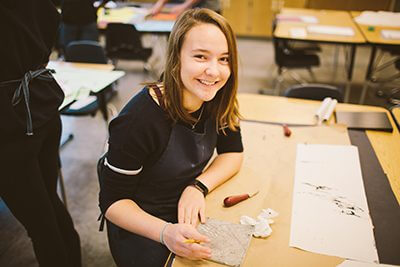 by Dr. Bill Hudson, Head of School
by Dr. Bill Hudson, Head of School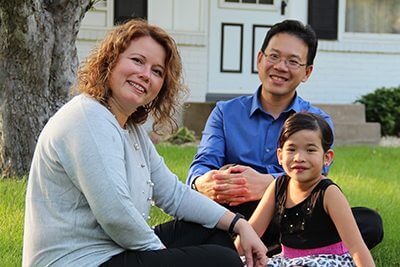 Lower School Parent
Lower School Parent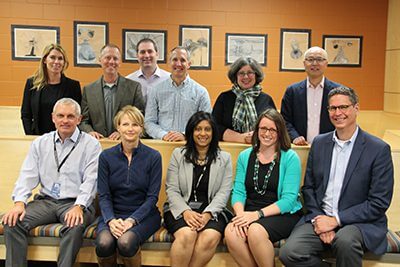 MPA’s Board of Trustees is a self-generative body of about 18–22 trustees, each of whom serves up to two 3-year terms. The Governance Committee of the Board solicits, evaluates, interviews, and recommends to the full Board, for its consideration, potential candidates to serve as trustees.
MPA’s Board of Trustees is a self-generative body of about 18–22 trustees, each of whom serves up to two 3-year terms. The Governance Committee of the Board solicits, evaluates, interviews, and recommends to the full Board, for its consideration, potential candidates to serve as trustees.